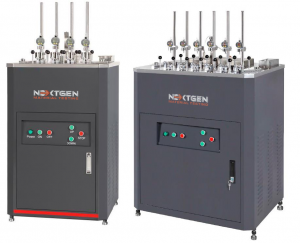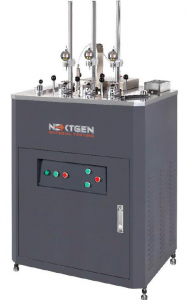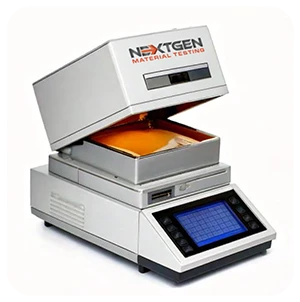Understanding how materials respond to heat is vital in industries using polymers and thermoplastics. Heat Deflection Temperature (HDT) and Vicat Softening Temperature (VST) are key factors that assess material’s thermal performance under stress. Having these metrics in place is a necessity for verifying product reliability, safety, and compliance with industry standards.
NextGen recognizes the importance of precise thermal analysis in material selection and quality assurance. To meet the evolving demands of the industry, we present the HDT/VICAT Testing Machine – Thermal Analysis for Plastics NG-HDT. This advanced system is engineered to provide accurate, reliable, and efficient testing of thermoplastics and polymers, supporting product development and stringent quality control processes.
Our blog focuses on the significance of HDT and Vicat testing, describes HDT/Vicat testing machines in detail, introduces the NG-HDT models, and discusses its compliance with international standards, core features, technical specifications, supported configurations, and more.
Understanding HDT/VICAT Testing Machines and Their Purpose
To fully understand the significance of the HDT/VICAT Testing Machine, it is fundamental to first cover the concepts of Heat Deflection Temperature (HDT) and Vicat Softening Temperature (VICAT).
Heat Deflection Temperature (HDT)
HDT is the temperature at which a polymer specimen deforms under a specified load during a three-point bending test. This test involves applying a constant load to a standardized specimen and uniformly increasing the temperature until the material exhibits a defined deflection, typically 0.25 mm. The HDT provides insight into material’s ability to maintain rigidity under both thermal and mechanical stresses. This makes it an integral component in applications that demand structural integrity at elevated temperatures.

Vicat Softening Temperature (VST)
The VST measures the temperature at which a flat-ended needle penetrates a polymer specimen to a depth of 1 mm under a specified load. The test is conducted by applying a constant force to the needle in contact with the specimen and increasing the temperature uniformly. The temperature at which the needle reaches the 1 mm penetration marks the Vicat softening point. For processes like molding and for applications that expose the material to heat, this parameter is critical for determining the temperature at which the material transitions from a solid to a softened state.
HDT/VICAT Testing Machines
HDT/VICAT testing tools are specialized systems used to evaluate the thermal behavior of polymer-based materials, primarily focusing on their resistance to deformation and softening at elevated temperatures. As mentioned before, these machines determine two fundamental properties: Heat Deflection Temperature (HDT) and Vicat Softening Temperature (VST).
In HDT testing, a standardized specimen is subjected to a three-point bending setup, where a constant load is applied while the temperature is gradually increased. HDT is recorded as the temperature at which the sample deflects to a specified extent, usually 0.25 mm. This test is notably valuable for assessing materials used in structural or load-bearing components, as it replicates real-world conditions involving both heat and stress.
In Vicat testing, a flat-ended needle is applied to the surface of a polymer specimen under a specified load. The temperature is raised at a uniform rate, and the VST is recorded when the needle penetrates the material to a depth of 1 mm. This method identifies the softening point of the material and is a necessity for applications that require dimensional stability under heat, such as molding and thermal forming processes.
These machines are commonly used for testing a broad selection of thermoplastics and polymer materials, including polyethylene (PE), polypropylene (PP), polyvinyl chloride (PVC), polystyrene (PS), nylon, and engineering plastics used in automotive, construction, electrical insulation, and consumer products. Additionally, some models assess elastomers and rubber-based materials for similar thermal performance parameters.
Introducing the NG-HDT Thermal Analysis System
 The NG-HDT HDT/VICAT Testing Machine is a high-precision system developed by NextGen Material Testing, for accurate thermal analysis of thermoplastics and polymers. It is designed to measure Heat Deflection Temperature and Vicat Softening Temperature with consistency, efficiency, and reliability.
The NG-HDT HDT/VICAT Testing Machine is a high-precision system developed by NextGen Material Testing, for accurate thermal analysis of thermoplastics and polymers. It is designed to measure Heat Deflection Temperature and Vicat Softening Temperature with consistency, efficiency, and reliability.
Built with durable, temperature-resistant components and a stable testing frame, the NG-HDT maintains measurement accuracy at elevated temperatures without frequent recalibration. The system supports fully automated operation and can be enhanced with an external chiller, which greatly improves cooling time and overall testing throughput.
The NG-HDT is suited to a wide array of professional environments, including manufacturing, research, and quality control. It supports users who require dependable testing results for product development, material validation, and compliance with international standards.
Compliance with International Testing Standards
The NG-HDT HDT/VICAT Testing Machine is fully compliant with a large number of international and national standards. Each of these standards defines specific test conditions and measurement procedures for evaluating thermoplastics and related materials’ thermal performance. Let us take a closer look at them:
-
ISO 2507 – Plastics piping and ducting systems – Thermoplastics – Determination of Vicat softening temperature.
This standard applies specifically to thermoplastic pipes and fittings, outlining methods for determining the Vicat softening temperature to guarantee safe performance in piping systems.
-
ISO 75 – Plastics – Determination of the temperature of deflection under load.
ISO 75 defines procedures for measuring plastic HDT under flexural load. It is used to determine the maximum service temperature at which a plastic can operate without excessive deformation.
-
ISO 306 – Plastics – Thermoplastic materials – Determination of Vicat softening temperature (VST).
This standard specifies methods for determining thermoplastic VST. It provides key data on heat resistance, which is a key factor in molding and thermal processing applications.
-
ASTM D648 – Standard Test Method for Deflection Temperature of Plastics Under Flexural Load in the Edgewise Position.
Widely used in North America, this standard outlines how to measure HDT with a defined load and heating rate. It is particularly important for assessing materials used in structural and high-heat environments.
-
ASTM D1525 – Standard Test Method for Vicat Softening Temperature of Plastics.
This standard describes the test procedure for determining the temperature at which a flat-ended needle penetrates a thermoplastic under a set load, providing VST data required for heat-forming processes.
-
GB/T 8802 – Plastics piping systems – Determination of Vicat softening temperature.
This standard is similar to ISO 2507 and addresses the performance of plastic pipes and fittings under heat, particularly in infrastructure and utility applications.
-
GB/T 1633 – Thermoplastics – Determination of heat deflection temperature under load.
The equivalent of ISO 75 and ASTM D648, this standard describes procedures to determine thermoplastic HDT under specified stress conditions.
-
GB/T 1634 – Plastics – Determination of Vicat softening temperature.
Equivalent to ISO 306, this standard defines methods to measure plastic VST, assuring material compliance on domestic and international markets.
Key Features of the NG-HDT Testing Machine
 The NG-HDT HDT/VICAT Testing Machine integrates advanced functionality and intelligent design to deliver high-accuracy testing with optimal workflow efficiency. Below is a list of its main features:
The NG-HDT HDT/VICAT Testing Machine integrates advanced functionality and intelligent design to deliver high-accuracy testing with optimal workflow efficiency. Below is a list of its main features:
- Combined HDT and VICAT Testing. The system allows both HDT and Vicat softening point tests to be conducted at the same time. This dual functionality increases productivity by reducing testing cycles.
- High-Stability Test Station. Constructed with a low-expansion Invar Steel alloy, the test station maintains dimensional integrity under high thermal loads. The system offers precise deflection measurements at temperatures up to 200°C without recalibration.
- Automatic Loading and Lifting. The system automates the placement and removal of test weights, minimizing manual intervention and operator fatigue. Motorized lifting simplifies the handling of samples, especially in multi-station configurations.
- Compact and Cost-Efficient Design. With a more compact bath structure, the NG-HDT reduces tank volume by over 50% compared to conventional systems. This results in lower oil consumption, faster heating and cooling cycles, and reduced operational costs.
- Precision Displacement Measurement. The machine is equipped with high-precision Swiss-made micrometers that provide a resolution of 0.001 mm and an accuracy of ±0.005 mm. Both HDT and VICAT tests can therefore be conducted with highly reliable deformation analyses.
- Multi-Station Capability. The system is available in 3, 4, or 6-station configurations, allowing parallel testing of multiple specimens. Each station can be equipped with independent deformation transducers and a shared temperature transducer for precise monitoring.
- Motor-Driven Station Lifting. Test stations can be raised and lowered at the push of a button, making specimen placement and removal safer and more convenient, especially when operating at high temperatures.
- Fully Automated Testing Process. Once configured via the software, the testing cycle runs automatically according to predefined parameters. This automation reduces human error, improves repeatability, and simplifies testing procedures.
- Automatic Bath Cooling. Following each test, the system automatically cools the oil bath to 280°C, reducing wait times between tests and improving equipment usage in continuous testing operations.
- User-Friendly Software Interface. The integrated software provides a professional and intuitive interface that simplifies test setup, monitoring, data logging, and result export. It is designed for both routine and advanced laboratory operations.
Optimized Cooling System with Chiller Integration
When paired with an external chiller system, the NG-HDT achieves significantly improved thermal management:
-
High Initial Cooling Temperature: Enables rapid cooling starting up to 280°C, minimizing thermal lag after high-temperature testing.
-
Fast Cooling Speed: Reduces cooling time to approximately 45 minutes, increasing test cycle efficiency and laboratory throughput.
-
Optimized Temperature Control: Maintains the test medium below 25°C post-cooling, resulting in accurate baseline conditions for subsequent tests and full compliance with ISO and ASTM heating requirements.
-
Water-Saving Design: Features a closed-loop water recycling system that reduces water usage while maintaining consistent cooling performance.
Test Station Engineering and Measurement Features
We should also mention a few words about its test station:
-
Flexible Test Configurations: Available in models with 3, 4, or 6 independent test stations to match varying sample throughput requirements.
-
Precision Loading System: Comes with standardized 10N and 50N dead weights for reliable load applications during HDT and VICAT tests.
-
High-Accuracy Deformation Measurement: Swiss-made micrometers provide precise monitoring of specimen behavior during heating.
-
Accurate Temperature Control: Japan-made RKC controllers guarantee uniform temperature rise with 0.5°C accuracy.
-
Thermally Stable Structure: The Invar Steel construction of the test frame allows dimensional stability and minimal expansion under high-temperature conditions.
Technical Specifications of the NG-HDT Series
The NG-HDT HDT/VICAT Tester is available in three configurations: NG-HDT300, NG-HDT400, and NG-HDT600, offering 3, 4, and 6 test stations respectively. All models share the same core design and performance parameters.
| Model | NG-HDT300 | NG-HDT400 | NG-HDT600 |
| Type | A | B | C |
| Test station | 3 | 4 | 6 |
| Immersion bath | 1 | 1 | 1 |
| Heat transfer medium |
Methyl Silicon oil,22 liter Viscosity: 300 cSt, or 300 mm2/s Silicon oil brand: DON CORNING PMX-200 350 cSt, KF96-300 Or transformer oil, 10#, 22 liter |
||
| Temperature sensor | 3 | 4 | 6 |
| Temperature range |
Ambient (20℃)-300℃ |
||
| Temperature accuracy |
±0.5℃ |
||
| Heating Speed | Speed A:
5±0.5℃/6min Speed B: 12±1℃/6min |
||
| Micrometer | 3 | 4 | 6 |
| Deformation measurement range | 0-10mm | ||
| Deformation resolution | 0.001mm | ||
| Deformation measurement accuracy | 0.003mm | ||
| Vicat loading capacity |
GA=10N±0.2N, GB=50N±1N |
||
| Deformation measurement range | 0-10mm | ||
| HDT Test |
Method A: USE FIBRE STRESS 1.80Mpa Method B: USE FIBRE STRESS 0.45Mpa Method C: USE FIBRE STRESS 8.00Mpa |
||
| HDT Test Span |
Outer span: 100mm, ASTM D648 Inner span: 64mm, ISO 75 |
||
| Maximum heating power | 5000W | ||
| Power requirements |
220V 50/60Hz 3 Phase |
||
| Dimensions | 32″ x 24.5″ x 28.5″ | ||
| Weight | 253 lbs | 253 lbs | 617 lbs |
| Cooling |
Nature cooling or water cooling (less than 150℃) |
||
HDT/VICAT testing machine Standard Accessories
| Model | NG-HDT300 | NG-HDT400 | NG-HDT600 |
| Type | A | B | C |
| Main Frame | 1 set | 1 set | 1 set |
| Test Stations | 3 | 4 | 6 |
| Swiss-made Micrometers | 3 sets | 4 sets | 6 sets |
| Platinum resistance temperature sensors | 3 sets | 4 sets | 6 sets |
| Temperature controllers | 3 sets | 4 sets | 6 sets |
| Loading nose for HDT | 3 sets | 4 sets | 6 sets |
| Needle for VICAT | 3 sets | 4 sets | 6 sets |
| Weight set (10N, 50N) | 3 sets | 4 sets | 6 sets |
| Test software | 1 set | 1 set | 1 set |
Final Thoughts on the NG-HDT Testing Solution
The NG-HDT HDT/VICAT Testing Machine combines high-precision measurement, reliable performance, and intelligent automation to meet the complex demands of thermal analysis in modern polymer testing. With full compliance with global standards, multi-station capability, and optimized workflow features, it offers an effective solution for laboratories focused on material quality, regulatory compliance, and product development.
If you have questions or would like to learn more about the NG-HDT system, please feel free to contact us or request an online quote. Our team at NextGen is ready to help you select the most suitable equipment for your specific testing requirements.


